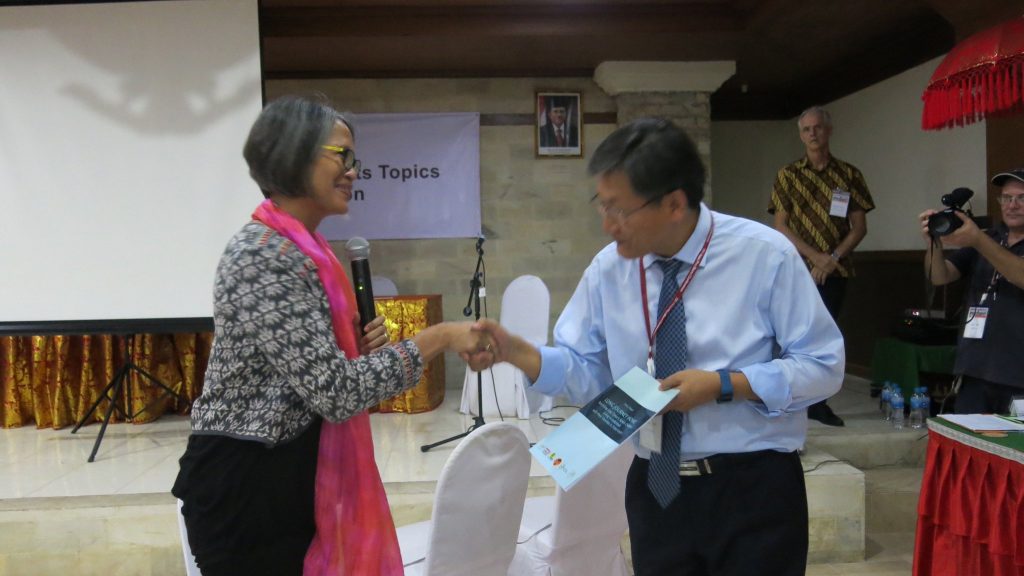Asia Justice and Rights, Bridges Across Borders South East Asia Community Legal Education Initiative (BABSEACLE) and the Office of the UN High Commissioner for Human Rights (OHCHR) conducted Workshop on Thematic Human Rights Topics from Around the Asia Region in complementary with 5th Pro Bono Conference in Sanur, August 29th 2016.
Over 70 participants, including lawyers, and NGO representatives participated on the discussion on how we address current and pressing human rights issues and involve in depth discussions on steps to moving forward to improve the current human rights situation in the region.
Patrick Burgess, AJAR’s President elaborated the development of Transitional Justice (TJ) framework in responding to gross human rights violation in transitioning country. Although TJ was regarded as old-fashioned way to deal with crimes against humanity in the contemporary context of conflict, it actually could be developed, as TJ needed context in each country it was implemented. Thus, TJ is loose framework rather a strict prescription to strengthening justice and end impunity in society. “However, no one has universal formula for resolving conflict, it highly depends on each country and its context,” he said.
First panel of the Pro Bono Conference also included the context of Myanmar and Indonesia. In Myanmar context, Han Gyi stated that process of transitional justice in newly elected government of Myanmar had been slow and still faced significant challenge from authorities. While Indria Fernida, AJAR’s Thematic Program Coordinator stated that Indonesia faced a setback in human rights work, although some progress had been made with the establishment of official Truth and Reconciliation Commission in Aceh.
On AJAR’s gender justice program, Galuh Wandita, AJAR’s Director explained how conflict was always gendered, and how human rights framework often overlooked grass root reality. Using example of victims of sexual violence story, she argued while the legal system on the surface promised the end of impunity, victims were often left behind as the perpetrators endured impunity. Thus, following the gender justice project, AJAR tended to work on grass root level, trying to learn together what was really going on for victims after years of the violations took place. This resulted in learning methodology titled Unlearning Impunity that tried to engage transitional justice framework in grass root society. The same point also emphasized by Sarala Emmanuel from Suriya Women’s Development Centre who worked closely with female victims of gender-based violence. In Sri Lanka context, Sarala pictured the difficulty to engage transitional justice framework in sexual violence cases. Although it was structural problem, the obstacles also came from victims’ fear to speak out, patriarchal society, and lack of ‘evidence’ in this matter.
The next panel discussion dealt with cooperation between United Nations and Regional Human Rights Mechanisms (RHRMs), civil society organizations (CSOs) and human rights defenders (HRDs). Moderated by Liza Sekuggya, from United Nations Office of the High Commissioner for Human Rights, this session scrutinized the human rights infrastructures and how they worked on regional level. There were also Heishoo Shin from UN Committee on Economic, Social & Culture, Nahla Haidar from UN Committee on the Elimination of Discrimination Against Women, and Baek Tae-Ung from UN Working Group of Enforced or Involuntarily Disappearance.

In the last panel, Nina & The Stolen Children of Timor-Leste was screened, and received warm and welcome response. Audience sparked their interest with intriguing questions concerning the current lives of those stolen children (now adults). In her remarks, Galuh Wandita explained how issues of children in war and conflict area expanded further beyond the war itself, but this issue was often neglected, especially in the context of stolen children in Timor-Leste. Since those children were now adults, the violation that happened to them was forgotten and justified. Closing the screening, AJAR handed policy paper on stolen children titled Long Journey Home to Mr. Baek Tae-ung, a member of Working Group on Enforced or Involuntary Disappearances of United Nations Human Rights Council.